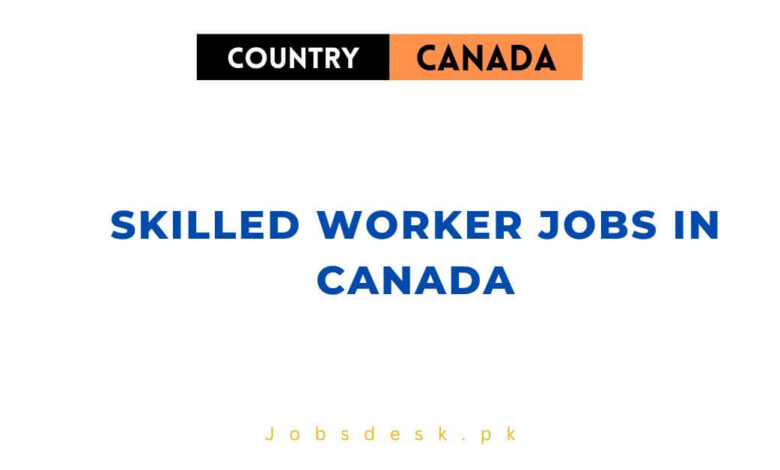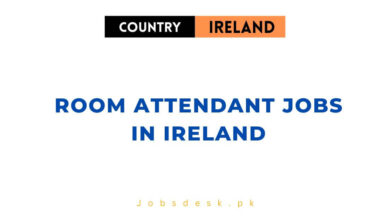Skilled Worker Jobs in Canada 2024 – Apply Now

Canada has become a prominent choice among highly trained individuals seeking improved living conditions and new opportunities due to its picturesque landscapes, exceptional standard of living, and welcoming multicultural society. The Canadian government provides skilled laborers with multiple avenues to obtain permanent residency status. This article will provide a comprehensive overview of the application process and stage-by-stage instructions required for skilled workers to migrate to Canada.
Check Also: Latest Jobs in Canada for Foreigners 2024 – Apply Now
Choosing Right Immigration Program
Canada provides skilled laborers with a variety of immigration pathways, each of which has distinct eligibility requirements. The Canadian Experience Class, the Provincial Nominee Program, and the Federal Skilled Worker Program are the three primary initiatives.
1. Federal Skilled Worker Program (FSWP)
This program is administered by the federal government, and candidates are required to meet a number of minimum criteria, including education, work experience, and language proficiency. Eligibility is established using a point-based system.
2. Provincial Nominee Program (PNP)
Through immigration schemes, provincial administrations nominate candidates whose skills are in high demand in their respective provinces. Particular provinces have distinct eligibility and application requirements.
3. Canadian Experience Class (CEC)
Possessing prior work experience in Canada while in possession of a temporary work visa qualifies you to apply to the CEC in order to be granted permanent status. This program is designed for individuals who have successfully integrated into Canadian society and have gained valuable professional experience.
Contributing Factors in Selecting an Immigration Pathway
Check Your Eligibility
To qualify as an immigrant of specialized labor to Canada, an individual must satisfy particular eligibility requirements. To obtain the latest information regarding eligibility prerequisites, it is advisable to consult the official website of the Government of Canada or an immigration specialist.
Employment History
Generally, individuals must have accumulated a minimum of one year of full-time (or comparable part-time) professional experience in an occupation classified as level 0, A, or B by the National Occupational Classification (NOC) in order to qualify. Your most recent employment should not have elapsed for over ten years.
Language Proficiency
A standardized language examination must be passed to demonstrate proficiency in either English or French. TEF (Test d’évaluation de francais) and IELTS (International English Language Testing System) are the two most widely used assessments in their respective fields. Your Comprehensive Ranking System (CRS) score is influenced, in part, by the result of your language examination.
Education
In order to enter Canada, one must possess a secondary (high school) or postsecondary diploma, degree, or an internationally recognized equivalent. The educational heritage of an individual has an impact on their CRS score.
Evidence of Funds
Upon your arrival in Canada, you will be required to provide evidence that you have sufficient funds to sustain yourself and your family. Whether or not you are traveling with family members will determine the minimum quantity.
Medical Exam and Criminal Record Check
Each candidate is required to undergo a medical examination administered by a panel physician in order to verify that they meet the health criteria of Canada. Additionally, it is mandatory for you and any family members who exceed a certain age to provide police clearance documents that attest to your spotless record.
Profile for Express Entry
Utilizing the Express Entry system, you are required to populate an online profile with pertinent details such as your education, skills, work experience, and language proficiency. Your Express Entry pool classification is determined by the profile from which your CRS score is computed.
Comprehensive Ranking System (CRS) Score
In order to be eligible for an Invitation to Apply (ITA) for permanent residency, your Comprehensive Ranking System (CRS) score is a significant factor. A variety of factors, including but not limited to age, education, work experience, language proficiency, and adaptability, contribute to its determination.
Examine Your Academic Background
When contemplating skilled worker immigration to Canada, it is advisable to take into account one’s educational heritage. The evaluation verifies that the credentials you have obtained internationally satisfy immigration and employment requirements and aids in ascertaining their equivalent in Canadian currency. The subsequent approaches may be implemented to evaluate an individual’s educational history:
Take Language Proficiency Tests
capable employee Applicants for Canadian immigration must pass language proficiency examinations. French and English are the designated official languages of Canada. Language proficiency evaluations encompass these two languages.
Get an Application Invitation (ITA)
The Invitation to Apply is a critical component of the Express Entry process for skilled worker immigration to Canada. An ITA is required to submit an official application for permanent residency. Strategies for Enhancing the Probability of Obtaining an ITA:
Quickly Respond to the ITA
You will have a brief window of time (usually sixty days) to submit your complete application for permanent residency after obtaining an ITA. Ensure that you adhere to all deadlines, acquire all necessary materials, and complete the application forms accurately.
Biometrics and Medical Examination
In order to obtain qualified worker status in Canada through the Express Entry system, one must successfully complete a medical examination and biometrics procedure. Certain procedures must be completed in order to verify your eligibility to enter Canada.
Decision on Application
Resolution Regarding Your Application
You will be duly apprised of the outcome pertaining to your application subsequent to the completion of all requisite investigations and verifications. It is possible that this determination will lead to either a denial or a confirmation of permanent residency. If your application is approved, you will receive instructions on how to proceed, which may include the submission of your passport and the payment of the Right of Permanent Residence Fee.
Passport Submission and Visa Stamping
You must have your passport stamped by a Visa Application Center (VAC) or the nearest Canadian embassy or consulate if your application is approved. In order to obtain a permanent resident visa, it is necessary to submit your passport, photographs, and other pertinent documentation during this process.
Travel to Canada
Once your passport has been affixed with your permanent resident visa, you are permitted to enter Canada. It is imperative that you adhere to the landing protocol and any other necessary procedures specified by the IRCC upon your arrival in Canada.
Obtain a Permanent Residency Confirmation (COPR)
A crucial prerequisite for skilled worker immigration to Canada via the Express Entry system is the acquisition of the Confirmation of Permanent Residency (COPR). The COPR, an official document, confers the designation of permanent resident in Canada. Consider the following when acquiring a COPR:
Benefits of Skilled Worker Jobs in Canada
- Robust Economy: Canada’s stable and prosperous economy makes it an ideal location for skilled workers to obtain employment. The nation’s robust economy provides job security and stability.
- High Incomes: In Canada, skilled employees typically earn competitive wages, which are frequently higher than in many other nations. The increased income can enhance your lifestyle and financial well-being.
- Standard of living: Canada consistently rates high in international indices of quality of life. The country provides access to outstanding healthcare, education, social services, and a clean environment, making it a wonderful place to reside and raise a family.
- Diverse job possibilities: The employment market in Canada is diverse, with opportunities in industries such as healthcare, technology, engineering, and finance, among others. In high demand are skilled employees in fields such as information technology, healthcare, engineering, and skilled trades.
- Permanent Citizenship: Numerous Canadian immigration programs for skilled workers, such as the Express Entry system, can result in permanent residency. This permits you and your family to reside, work, and study in Canada indefinitely, with the option to apply for Canadian citizenship in the future.
- Availability of Social Services: As a Canadian resident or citizen, you have access to a variety of social services, such as healthcare, education, unemployment benefits, and retirement programs.
- Cultural Diversification: Canada is renowned for its multiculturalism and diversity of culture. You can experience a multicultural society and participate in a vast array of cultural activities and events.
- Security and Safety: With one of the lowest crime rates in the world, Canada is regarded as one of the safest places to reside and work.
- Work-life equilibrium: Employers in Canada frequently prioritize work-life balance by providing employees with reasonable working hours and paid vacation time, thereby enhancing life quality.
- Educational Possibilities: If you have children, Canada provides an excellent education system that includes both public and private schools, as well as prestigious universities and colleges.
- Medical care: Canada’s publicly financed healthcare system provides residents with access to essential medical services without the financial burden of high medical expenses.
- Stunning natural scenery: Mountains, forests, lakes, and coastlines comprise Canada’s magnificent natural landscapes. Enthusiasts of the outdoors can participate in a variety of recreational activities.
- Immigration-Proactive Policies: Canada values immigrants’ contributions to the nation’s development and prosperity. The immigration system is intended to attract qualified employees and their families.
Conclusion
Possessing expertise in Canada offers a unique opportunity for individuals in pursuit of enhanced quality of life, professional growth, and long-term security. Canada is an attractive destination for competent professionals seeking to prosper in an inclusive and diverse environment owing to its manifold significant advantages.
A robust economy and a commitment to multiculturalism foster an atmosphere in which competent employees are incentivized with various benefits and motivated to impart their expertise. Competent employees and their families will enjoy an array of advantages, including a harmonious work-life equilibrium, superior educational and healthcare systems, and a comfortable benchmark of living.
In addition, the path to eventual citizenship and permanent residence in Canada provides security and the opportunity to fully integrate into Canadian society. The country’s emphasis on social services, safety nets, and family reunions demonstrates its commitment to the well-being and cohesion of its populace.
Canada is an excellent place to establish a family because it is a hospitable nation that welcomes professionals in search of personal development and family life. A location can be found for everyone to name a home due to the variety of communities and landscapes.
Skilled labor in Canada provides the opportunity to contribute to the country’s development while also benefiting from the country’s hospitable citizens, abundant economic opportunities, and commitment to a superior quality of life. This individual elects to pursue occupational training in Canada so that they may assist individuals and their families in securing a prosperous and joyous future.
For More Info:
Email Your CV, and We’ll Find the Best Pathway For you: info@jobsdesk.pk
Frequently Asked Questions:
-
What is a skilled worker in Canada?
Skilled workers are chosen as permanent residents based on their education, work experience, knowledge of English and/or French, and other factors.
-
Which field is easy to get a job in in Canada?
Newcomers can easily get jobs in Canada in the fields of sales and marketing. Candidates must have a bachelor’s degree in business administration. For this occupation, they do not require a license. The average salary for sales and marketing in Canada is $77,350 per year.
-
What is the salary of a skilled worker in Canada?
The average skilled labor salary in Canada is $40,401 per year or $20.72 per hour. Entry-level positions start at $34,215 per year, while most experienced workers make up to $58,500 per year.



